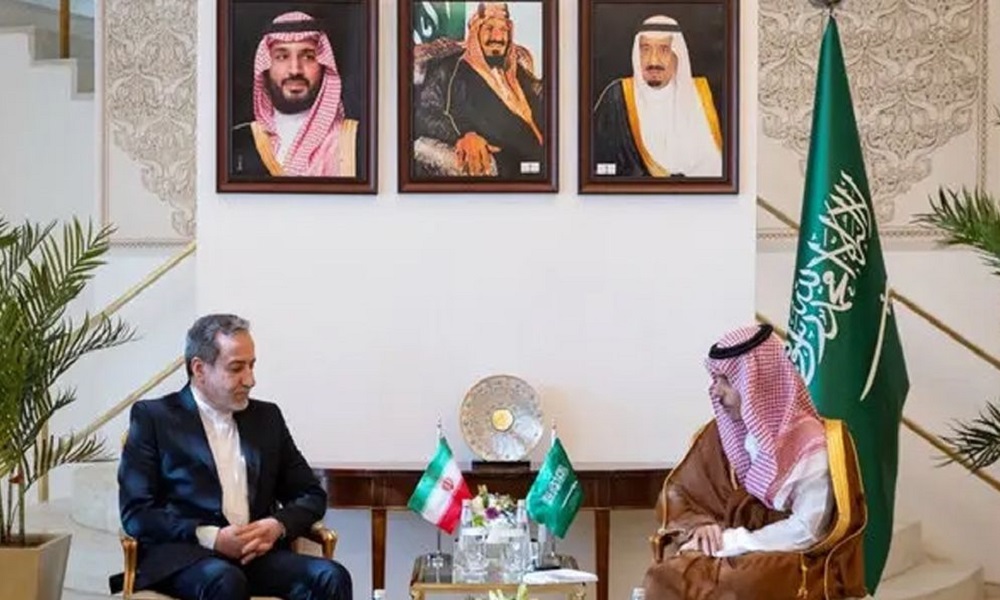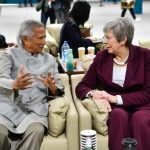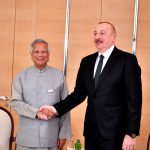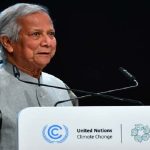
Saudi-Iran, not Israel, leading the change in the Middle East
Last Updated on October 25, 2024 5:37 am
Without Israel, the Middle East is experiencing a change. And Saudi Arabia and Iran are leading it. Saudi Arabia is gradually warming up its relations with its eternal enemy Iran. In this, the country has indicated that Riyadh will not establish diplomatic relations with Tel Aviv without the establishment of a Palestinian state. This is a significant change in Saudi Arabia’s position.
The images of children buried alive under the rubble of Gaza, mothers wailing in front of their dead children, and the Israeli blocking of food for hungry Palestinians – all these have made it impossible for the Saudi leadership to ignore the issue of a Palestinian state.
Ali Shihabi, a Saudi businessman and close to the royal family and a member of the NEOM project advisory board, said that what Gaza has done is to postpone the issue of Israel’s annexation of the region.
He said that Saudi Arabia sees that any relationship with Israel has become increasingly toxic since the Gaza incident. Unless the Israelis change their position and show a real commitment to a Palestinian state—a demand that Israel consistently denies—then this position will not change much.
The long-standing rivalry between Saudi Arabia and Iran stems primarily from the struggle between the two main branches of Islam—Sunni and Shia. And Hamas, Hezbollah and the Houthis are the products of Iran’s desire for hegemony.
Until now, Saudi Arabia and its Gulf allies have been skeptical of the sincerity of Iran’s diplomatic moves. Because while Iran’s two so-called proxies, Hamas and Hezbollah, are fighting Israel, another proxy is arming and supporting the Houthis in Yemen. And the Houthis once strongly opposed Saudi Arabia.
Ali Shihabi said that Saudi Arabia would never turn away if the Iranians extended their hand to Riyadh. And if Iran is truly sincere, it will be a true reconstruction of the Middle East.
Young people in the Gulf countries, constantly seeing the brutal images of the Israeli aggression in Gaza on social media, have turned whatever positive or at least ambivalent attitude they had towards Israel into hatred. While a large part of the population of the countries in the region is young. In 2022, the average age of Saudi citizens was 29 years old.
Meanwhile, the situation in Gaza has completely changed this view. The Saudi crown prince, advocating for the establishment of a Palestinian state, said in a speech to his advisory council on September 18, “Saudi Arabia will not stop its tireless efforts to establish an independent Palestinian state with East Jerusalem as its capital, and we confirm that Saudi Arabia will not establish any diplomatic relations with Israel without it.”
He gave a similar speech at the US State of the Union.
Just a year ago, Saudi Arabia was moving towards normalizing relations with Israel. This could have fundamentally changed the entire Middle East. At the same time, it would have easily isolated Israel’s biggest enemy, Iran. In addition, the question of a Palestinian state would not have been raised forcefully.
But now, the Saudi-Israeli normalization agreement is far from what it was at any time in the past. Although there is hope for a ceasefire in Gaza after the assassination of Hamas leader Yahya Sinwar, the situation is still not going in Israel’s favor.
In addition, Iran, Russia and Oman have started joint naval exercises in the Indian Ocean. Saudi Arabia, India, Thailand, Pakistan, Qatar and Bangladesh will be observers.
Clearly, a diplomatic detente (de-escalation process) is underway in the Middle East. But Israeli Prime Minister Benjamin Netanyahu has not been able to reach an agreement with Riyadh as planned.
Netanyahu has long said that his country wants to make a deal with Riyadh. But recently, the foreign ministers of the Persian Gulf countries have met with the Iranian foreign minister in a series of meetings, which is the first in history.
This change, although shaky, has given Iran an opportunity to overcome the religious animosity that exists between the countries of the region. But more importantly, it has presented a golden opportunity to stop the bloodshed that has been caused by this animosity in the region over the past few decades.
Iranian Foreign Minister Abbas Araghchi has visited not only the Gulf countries, but also Saudi Arabia. He has visited Iraq and Oman. As a result, it may be possible to ease the existing tensions between the countries. In addition, he has visited Jordan, Egypt and Turkey. This is the first time in the past 12 years that an Iranian foreign minister has visited Egypt.
Last Friday (October 18), Iranian Foreign Minister Abbas Araghchi said in Istanbul during a visit to Turkey that we now have a common grievance regarding the risk of war spreading in the region, the war in Gaza-Lebanon and the displaced people.
It is clear that the positions of the countries he visited on these issues are very close, if not identical.
While Israeli Prime Minister Netanyahu has repeatedly denied the demand for the establishment of a Palestinian state, Saudi Arabia is trying to keep the issue alive in the media and diplomatic forums everywhere.
Saudi Arabia, known as the leader of the Arab world, has repeatedly said in recent times that if Israel wants to have us on its side, the only way is to establish a Palestinian state.
Why is Iran pushing to mend ties with the Gulf states?
Observers think that the Israeli strikes in recent weeks have killed most of Hezbollah’s top leadership, so it may be stalling for time. The Lebanese militia has long been Iran’s most powerful Arab ally and proxy.
The group has long been a tool for Tehran to project power against Israel and in the Middle East. Hezbollah has been a major Iranian backer and is giving Israel a hard time. Without Hezbollah, Tehran is severely weakened in the region.
The ongoing war in Gaza has also forced the signatories of the Abraham Accords to start advocating for a Palestinian state. They are also concerned about their own public opinion. Although the United Arab Emirates has maintained relations with Israel for the past few years, these relations have also come under increasing pressure in recent years.
Perhaps that pressure is why UAE Foreign Minister Sheikh Abdullah bin Zayed said last month that Israel would also be responsible for rebuilding Gaza after the war ends.
He said the UAE was not prepared to support any further steps in the Gaza war without the establishment of a Palestinian state.
While Netanyahu has been claiming that Israel is working on a landmark agreement with Riyadh, Saudi officials have largely ignored the issue, highlighting the country’s wide-ranging public divisions.
Ali Shihabi said the Abraham Accords were essentially a showpiece. They had nothing significant in terms of a real, lasting regional peace agreement. The countries that signed them did so because they saw Israel as a way to exert influence in Washington.
But now we see that the United States has no power or influence over Israel — which is humiliating, and the Israelis have no desire to create a Palestinian state.
Source: New York Times






